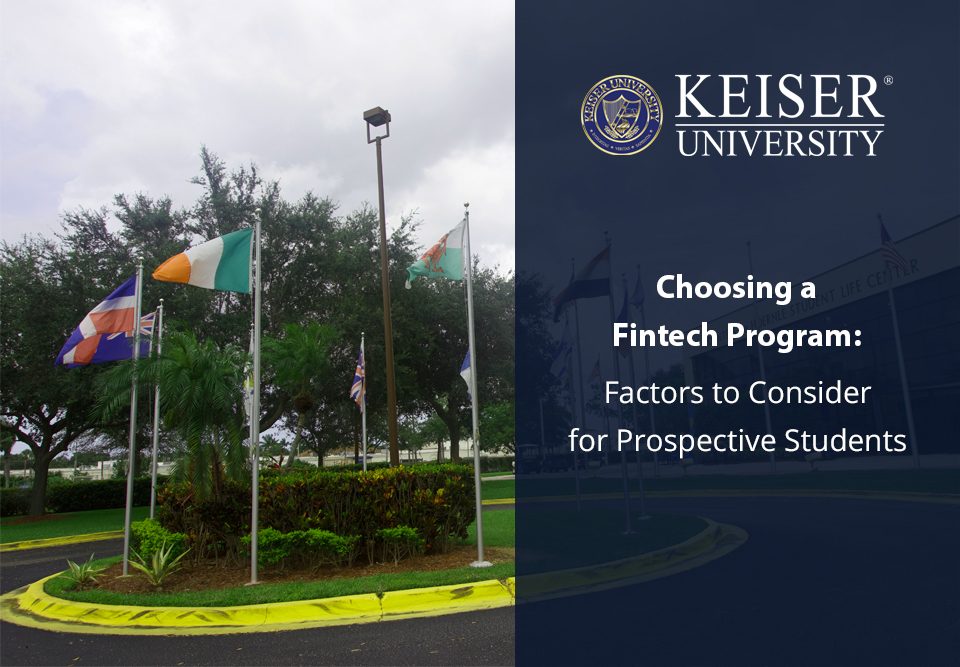What degree do you need for fintech? What kind of fintech program is right for you? And, is a fintech degree worth it?
By weighing a variety of financial and career-related factors, you can find the ideal fintech master’s program for you. If you have questions about fintech degree programs, read on to find some quick and helpful answers.
How to Choose a Fintech Degree Program
No two fintech master’s programs are created exactly equal; that’s why it’s essential to measure the relative value of each. Before identifying a program that meets your unique wants and needs, however, consider a few key questions about the fintech degree in and of itself.
Is a Fintech Degree Worth It?
As its name implies, fintech stands at the intersection of the financial and technology sectors. Thus, the field is a great one for anyone with a serious interest in finance, tech, and the analytical elements that these fields share. While it is possible to break into this realm without a relevant college degree, it isn’t usually simple — especially given that fintech is a highly desirable field to enter. In fact, projections by global management consulting firm McKinsey & Company show that the fintech industry will grow at three times the rate of the banking industry as a whole through 2028.
What Can You Do With a Fintech Degree?
There are virtually limitless opportunities in the finance and business worlds related to fintech, and the right fintech degree can help you seize them. From PayPal to Square, many of today’s top companies are, essentially, fintech companies.
Some of the most common and popular fintech positions today include:
- Financial technology analyst
- Blockchain developer
- Quantitative analyst
- AI developer
- Risk and compliance technology officer
- Chief technology officer
To learn more about the versatility of a fintech degree, see Financial Inclusion & The Role of Fintech, a Keiser Voices panel discussion.
Defining Your Career Interests and Goals
The first step toward breaking into fintech is to pinpoint your interests and goals within the field. This will help you determine what degree or program to pursue, then successfully apply and gain admittance to your program of choice.
Identifying Long-Term Career Aspirations
You must not only define your ultimate professional goals in fintech but also clearly articulate them. Learning to communicate your aspirations is crucial because you will likely be asked to speak and write about them at length while applying for both schools and jobs.
Understanding Your Interest in Fintech Fields
Try to align your interests with one or more of the major industries and professional sectors of fintech. Some of the most common among these areas include:
- Mobile banking
- Peer-to-peer payments
- Investment management apps
- Digital currencies
- Cryptocurrency exchanges
- Budgeting and personal finance apps
Aligning Personal Strengths with Fintech Careers
After identifying your interests, embark on an honest assessment of your capabilities. As you investigate your fintech degree options, look for programs that would give you the specific knowledge and skills you will need in future endeavors.
Researching Fintech Degree Program Options and Institutions
Below are a few aspects to keep in mind as you begin to conduct your research and examine various fintech degree paths with a critical eye:
Types of Fintech Degrees
The world of fintech education has expanded substantially over the past decade. Today, numerous institutions offer fintech-specific degree programs at the certificate, undergraduate, and graduate levels. You can also pursue fintech degrees with different areas of specialization, such as blockchain technology, digital payments, or artificial intelligence.
Accreditation and Reputation of Fintech Programs
Degrees from different institutions will inevitably carry different amounts of weight in the employment market. A diploma from an unaccredited or disreputable school may not be worth the paper it is printed on. Well-regarded across a range of industries, for instance, Keiser University holds accreditation through the Southern Association of Colleges and Schools Commission on Colleges.
Choosing Between Traditional vs. Online Fintech Master’s Programs
There are various pros and cons attached to learning in a traditional, brick-and-mortar classroom versus learning in the virtual, online space. Although face-to-face instruction and class interaction can be significantly enhanced when students are in the same room physically, online learning also accompanies many compelling benefits.
Benefits of an Online Fintech Program
Here are just a few of the most attractive elements and features of pursuing a fintech degree online:
Convenience and Flexibility of Online Learning
In-person education demands that students either live on campus or commute to class. Because you can attend online classes from your existing home, they are more convenient in terms of saving money, time, and energy. Furthermore, online programs tend to be far less time-sensitive than traditional programs, which gives students the flexibility to learn at their own pace.
Balancing Work, Life, and Education
In addition, online programs are generally more flexible in terms of scheduling. If you have a full-time job or time-consuming personal commitments, you may find that an online program offers a far better work-life balance.
Evaluating Curriculum and Specializations
Whether or not you plan to specialize in a particular area of fintech, you should make sure that the curriculum and general academic focus of your chosen program meets your immediate educational demands and supports your long-term career objectives.
Core Subjects Covered in Fintech Programs
A quality fintech program will ensure its graduates are well-positioned for leadership roles in today’s tech-driven financial sector. Common courses in a quality fintech program might include subjects related to:
- Data analytics
- Artificial intelligence (AI) and machine learning
- Digital payments and marketplace lending
- Cryptocurrency and blockchain
- Data visualization
- Fintech law and policy
- Technology innovation
- Financial security
Available Specializations
Academic fintech specializations tend to mirror the major industries and professional sectors of fintech, such as:
- Insurance
- Budgeting and personal finance
- Investment strategies
- Digital currencies
- Blockchain and cryptocurrency exchanges
- Mobile banking and peer-to-peer payments
Practical Learning Opportunities
All aspiring fintech professionals should take full advantage of any real-world or hands-on learning experiences they can accumulate through a fintech degree program. This might mean taking a capstone course, an internship, or volunteer opportunities.
Industry-Relevant Certifications and Courses
Beyond pursuing one or more college degrees relevant to your fintech career path, consider various industry certifications such as the Certified FinTech Analyst (CFTA) and Certified Anti-Money Laundering FinTech Compliance Associate (CAFCA). Many fintech professionals also hold traditional business and finance designations like certified public accountant (CPA) and certified business analysis professional (CBAP). Additionally, you may take fintech-oriented continuing education (CE) courses from industry organizations.
Key Personal and Financial Considerations
While your chosen degree and program are important, the most crucial variable in your fintech education is you. Here are just a few personal matters to consider when evaluating your fintech degree program options:
Tuition Costs and Financial Aid Options
An honest and detailed appraisal of your personal finances and budgetary restrictions should be an essential component of your fintech degree program search. It is worth noting that online programs are typically less expensive than traditional, in-person programs.
Understanding the Job Market and Employment Opportunities
McKinsey & Company and other organizations have identified fintech as a booming employment sector that is only projected to grow. Multiple sources have singled out fintech as the fastest-growing sector across the job market throughout the summer of 2024. So, while no college degree program can guarantee a rewarding job upon graduation, a fintech degree offers high chances of a satisfactory return on investment.
Additional Factors to Consider
Even if not among your most central and immediate concerns, you shouldn’t overlook the extra value that the below factors can provide to your fintech education experience.
Faculty Expertise and Industry Connections
A college course, in fintech or any other discipline, is only as good as its instructor. Therefore, it’s ideal to ensure that your professors have the targeted expertise needed to provide an exceptional learning experience that focuses on practical skills. Students who value real-world relevance likely want to choose a program with instructors who have worked in the financial or business sectors. Regardless, a good fintech program should offer opportunities to make valid industry connections through instructors, alumni, fellow students and/or partnerships with active companies.
Program Flexibility and Learning Format
After assessing your preferences and demands, you may decide to prioritize programs that stress flexibility in terms of class schedule, course pace or other matters of personal importance. For many, this means gravitating toward the online learning format.
Student Support Services
From financial aid to career counseling to extracurricular organizations, certain student support services are more valued than others depending on the person. At the very least, your chosen institution of learning should offer comprehensive and personalized academic advisement. Research your fintech program options thoroughly to ensure that you can get the services you want and need.
Technology and Learning Tools
Digital technology will play a central role in your daily work as a fintech professional. Thus, it only makes sense to evaluate the types of fintech software and platforms that your chosen fintech program teaches. You may also want to assess the technological learning tools that your program asks students to use.
Consider the Fintech Master’s Program at Keiser University
If you are serious about establishing or furthering a career in the fintech sector, consider pursuing a fintech master’s degree. At Keiser University, we offer an online Master of Science in Financial Technology program that takes a comprehensive, in-depth approach to examining the place and potential of tech in the modern financial and business sectors. Contact an admissions counselor today to learn more.






 The instructors at Keiser University impacted my life. They believed in my ability to become a great graphic designer, regardless of how I felt about my skills. KU helped to prepare me for the real world and got me to where I am today.
The instructors at Keiser University impacted my life. They believed in my ability to become a great graphic designer, regardless of how I felt about my skills. KU helped to prepare me for the real world and got me to where I am today.
